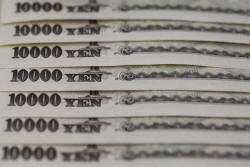|
 G7,
markets face struggle to quell yen volatility G7,
markets face struggle to quell yen volatility
 Send a link to a friend
Send a link to a friend
[May 18, 2016]
By Jamie McGeever
LONDON (Reuters) - For world markets, the
main focus at this week's Group of Seven meeting in Japan will be how
much leeway the host nation is given to boost economic growth and
inflation, specifically through depreciation of the yen.
|
|
 Japan's economy is struggling in the face of a stronger exchange
rate that has damaged growth, intensified deflation, crushed stock
prices and prompted the Bank of Japan to impose negative interest
rates on certain bank deposits. Japan's economy is struggling in the face of a stronger exchange
rate that has damaged growth, intensified deflation, crushed stock
prices and prompted the Bank of Japan to impose negative interest
rates on certain bank deposits.
Though the economy expanded at its fastest pace in a year in the
first quarter, analysts said Wednesday's data was not strong enough
to dispel concerns over a contraction this quarter.
In short, 'Abenomics' remains in trouble. The question is what Prime
Minister Shinzo Abe can do to restore Japan's economic fortunes
without incurring the wrath of his G7 partners. For that, read
direct intervention to rein in a currency that has rallied 10
percent so far this year.
The yen's swings are a broader reflection of market sentiment around
the world. A rising yen hurts Japan's economy, but also signals
investor caution, a decrease in risk appetite, and money going to
ground globally.
In a world where growth and investment returns are low, policymakers
would prefer not to have high volatility around a strengthening yen.

That was the scenario earlier this year when its rally coincided
with a steep fall in world stocks, wider credit spreads and a spike
in volatility, a confluence of events in part fueled by the BOJ's
imposition of negative rates.
Dollar/yen implied option volatility spiked to its highest in almost
three years as world markets suffered.
In public, G7 finance officials meeting in Sendai will likely repeat
previous commitments not to manipulate exchange rates and to refrain
from competitive devaluations.
The fear is that if Japan intervenes to weaken the yen, others -
particularly China and other G20 emerging markets - may do likewise
with their currencies. Privately, Japan may signal that the option
of market intervention remains on the table.
Broad market volatility is still within historical ranges and
policymakers would like to keep it that way -- but they will be
reluctant to give any sort of blessing to Japanese intervention.
"Abenomics is doing so poorly right now that no matter what the G7
said, if dollar/yen goes below 105 and towards 100 Japan will
intervene," said Steven Englander, global head of FX strategy at
Citi in New York."The Japanese may be willing to accept the
international political consequences, as the domestic consequences
of stronger yen and weaker equities are much more dire."

[to top of second column] |

RECORD LONG
Futures market data from the Chicago Mercantile Exchange shows
currency speculators have turned hugely bullish on the yen in recent
months and hold one of the biggest long positions - effectively a
bet that an asset will rise in value - on record.
The yen hit an 18-month high of 105.55 per dollar on May 3,
prompting Abe's adviser Koichi Hamada to tell Reuters Japan would
intervene if it firmed to between 90-95 per dollar, even if that
upset the United States.
U.S. Treasury Secretary Jack Lew and others argue Japan has relied
too heavily on monetary policy and should focus more on boosting
domestic demand and structural reforms to make its economy more
efficient.
To that end, fiscal stimulus from Tokyo might be more likely. But
only if everyone is on board - by no means certain if fiscally
conservative German Finance Minister Wolfgang Schaeuble has his way.
The yen has since slipped to almost 110 per dollar, perhaps a sign
that FX traders are pricing in a degree of G7 support for Japan's
desire for a weaker exchange rate.
But that could be risky, says Steve Barrow, head of G10 strategy at
Standard Bank.
"The only market reaction to G7 will probably be in the yen but it
looks to me like the market may be a bit vulnerable if there's a
lack of support for Japan from G7," he said.
(Reporting by Jamie McGeever; editing by John Stonestreet)
[© 2016 Thomson Reuters. All rights
reserved.] Copyright 2016 Reuters. All rights reserved. This material may not be published,
broadcast, rewritten or redistributed.
 |